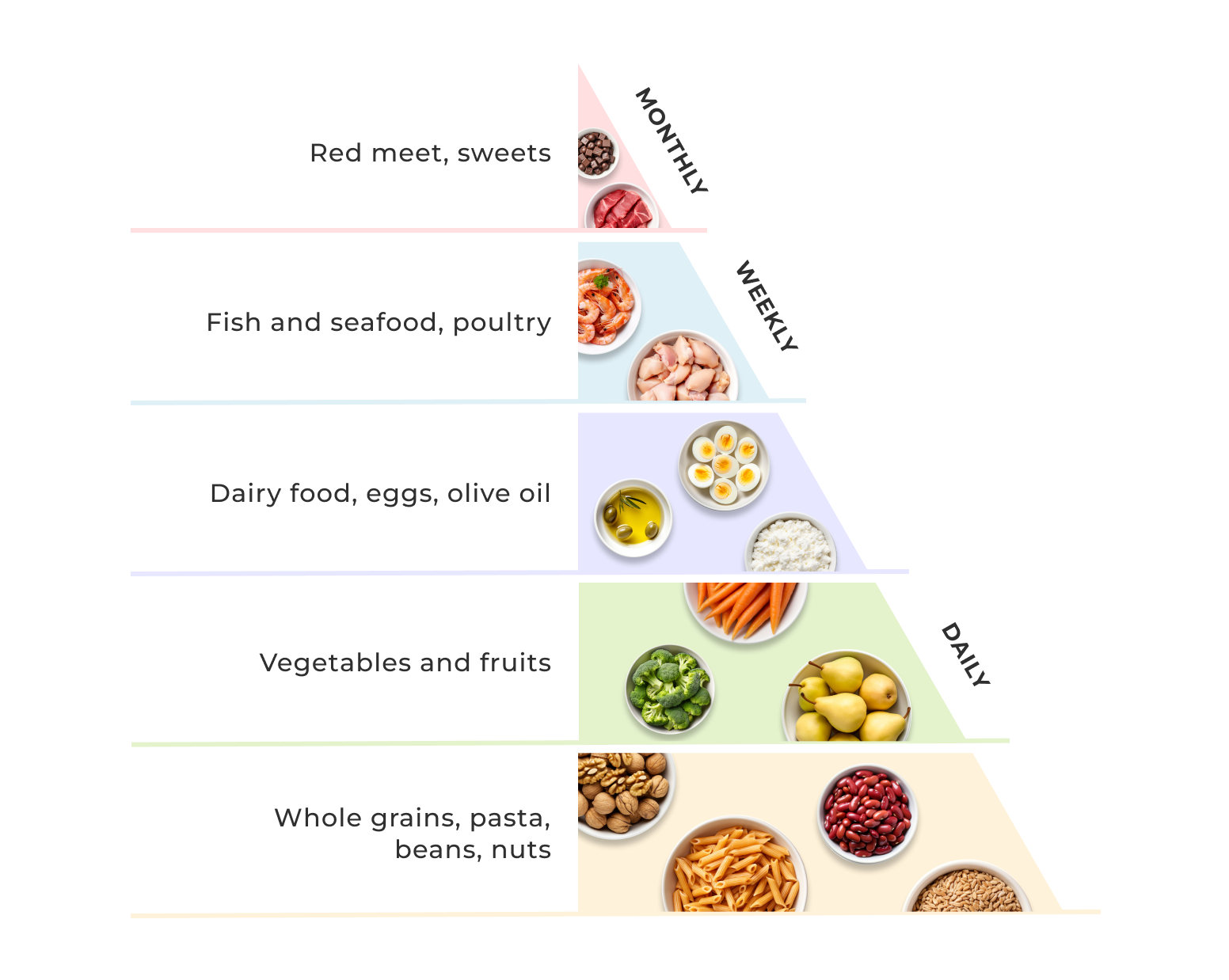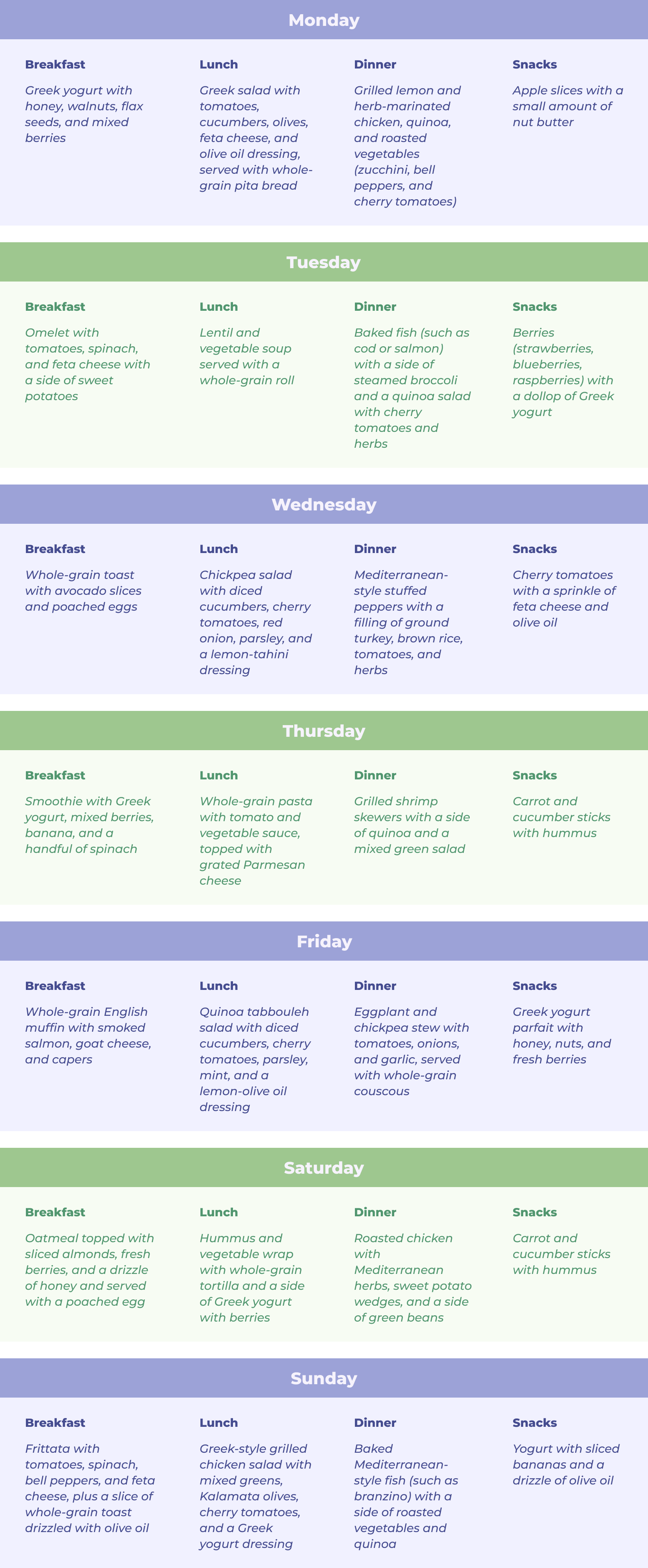Simple’s Mediterranean diet meal plan for weight loss

All over the world, if there’s anything we all have in common, it’s that we eat. Through breakfast, lunch, dinner, and snacks, food connects us, fuels us, and comforts us. What we eat, however, is as diverse as we are. Depending on where we’re from, we’ll have certain foods that are staples in our diets or certain ways that we prepare those foods. One particular region’s cuisine, the Mediterranean, has been in the number one spot as the healthiest for years.

Thinking of the more popular countries surrounding the Mediterranean Sea, you probably have visions of tomatoes, olives, pasta, and wine dancing in your head. While these foods are all parts of the Mediterranean diet, the Mediterranean diet meal plan is also about a lifestyle that celebrates not only fresh, whole foods but also cooking at home, an active lifestyle, and a sense of community.
We’ve got all you want to know about the Mediterranean diet for beginners. So, let’s dive in!
The Mediterranean diet — what is it?
Although there are many countries that border the Mediterranean Sea, the foods highlighted in this famed diet plan are popular in Greece, Italy, and Spain. It is essentially a plant-based diet built around whole foods, easily accessible in these regions. These foods include a heavy focus on fresh vegetables and fruit, whole grains, beans, legumes, fish, olive oil, and nuts.
How does it work?
Ok, ok, but how does this Mediterranean diet plan actually work, and what does it have to do with weight loss? Well, first, it’s not really a diet plan but a lifestyle. Not only is it full of a variety of wellness-promoting nutrients, but it also promotes an active lifestyle — walking to the local market for your fresh groceries, for example. An element of community is also an important part of the Mediterranean lifestyle — families and neighbors coming together to mindfully eat and savor a meal together, everyone contributing their part of the meal.
The most important thing about the lifestyle is its sustainability. The healthy fats from olive oil, fish, and nuts help keep you full longer — no hangry feelings of being deprived. Feeling full faster and longer prevents extra snacking and can support weight loss efforts.[1] The variety of fresh whole foods keeps things interesting, while the fresh herbs and spices keep things delicious and fresh. Eating well on the Mediterranean diet is about balance, flexibility, and even a little red wine, if that’s your thing.
Sounding a little too good to be true? We hear that a lot around here when we talk about fasting as another approach to weight loss and overall wellness (if you’re interested in learning more about fasting, you can check out our Simple quiz to see how we can help you get started with an intermittent fasting meal plan), but we can assure it’s not. While it’s pretty great, there is no perfect diet or lifestyle for everyone. There can be some drawbacks, but we’ll walk you through both sides.
Benefits and drawbacks of the Mediterranean diet

Benefits
Heart health — Olive oil, a major player on the Mediterranean diet food list, is a monounsaturated fat. Monounsaturated fats have been shown to protect against heart disease.[2] Throw in the high fiber content from whole grains and whole fruits and vegetables (which also contain antioxidants), and you have a cardioprotective super team.[3] But wait, there’s more — the Mediterranean diet also makes room for moderate consumption of red wine. Often served with dinner, red wine has polyphenols like resveratrol, which boasts its own antioxidant properties and has been shown to improve lipid profiles and insulin resistance.[4]
Longevity — Plant-based eating patterns like the Mediterranean diet are high in antioxidants from fruits and vegetables.[5] These protect against metabolic diseases [6] that can especially show up in later years by protecting the cells from damage due to toxicity and oxidative stress, helping to protect against cancer from cell mutations.[7,8]
Weight management — The high fiber content of beans, legumes, fruits, and vegetables and the fat content of olive oil, fatty fish, and nuts all lead to feeling full faster and longer, helping you to eat less and less often without feeling hungry or deprived. Starting the day with a nice balanced breakfast, coupled with more movement and the mental-health-supporting, stress-reducing feelings of being around your community, means you’ve got a powerful combination for supporting not just weight loss but fat loss, too.[1]
Brain health — Whole fruits and vegetables have a high content of antioxidants (these fight free radicals that can cause cell damage) and vitamins like E and C that protect against degenerative diseases like cognitive impairment due to Alzheimer’s.[9]
Fertility — Preparing the body to grow a whole person, as you can imagine, is best done by eating well. With a plan like the Mediterranean diet, you can get plenty of fertility-supporting healthy fats like omega-3 fatty acids and poly- and monounsaturated fats, which are key to hormonal balance.[10]

Drawbacks
Cost and accessibility — Fresh whole foods, physical activity in the fresh air, and community meals with family, friends, and neighbors are all fine and good but may not be easily accessible for everyone.
If fresh fruits and vegetables are out of reach for you, you can still benefit from frozen foods and even some canned foods; just be sure to avoid added sodium.
If you don’t have a community nearby for big meal get-togethers, you can still take time to practice mindful eating and savor your meals. Take a little time in the morning to savor your breakfast before hitting the morning rush, or slow down and enjoy dinnertime without distractions.
If your neighborhood is not conducive to a walk or kicking a ball around or whatever outdoor movement you enjoy, you can still benefit from moving around inside your home. Crank up the tunes and dance like nobody’s watching. We dare you to not feel better after.
Adherence difficulty — Because adhering to a Mediterranean diet menu will require planning ahead, grocery shopping, and meal prep, it can seem daunting to get started. We’ve got a sample meal plan coming up later to help get you started.
Potentially excess calories — With an increased intake of higher-fat foods like olive oil and nuts, the calories can add up quickly.
Cultural adjustment — Don’t want to trade your culture in for another? No worries, you don’t have to give up to gain.
First, you can follow the same principles as the Mediterranean diet with the fruits, vegetables, grains, seafood, beans, and legumes that feel like home to you. Instead of sardines and polenta for breakfast, have your traditional fish and fungi. Instead of chickpeas and quinoa for dinner, have grandma’s pigeon peas and rice.
Second, another simple way to adopt the Mediterranean diet but stay true to your heritage is to eat traditional Mediterranean foods but use whatever fresh herbs and spices are synonymous with the cuisine of your roots.
Third, maybe do a little research. Although Greece, Italy, and Spain are the countries most thought of for Mediterranean diet examples, several other countries and cultures surround the Mediterranean Sea. Maybe your roots tie back to one of those, and you won’t have to venture too far from your cultural heritage.
Simple’s Mediterranean diet food list: what to eat and what to limit

The best Mediterranean diet food list will contain a wide variety of fresh whole foods, including:
- Fruits: pomegranate, cantaloupe, honeydew, figs, grapes, olives, peaches, apricots, plums, cherries, berries, citrus, apples, pears, tomatoes, and persimmons
- Vegetables: cucumbers, artichoke, garlic, onion, peppers, eggplant, zucchini squash, carrots, green beans, cabbage, radish, spinach, kale, and mushrooms
- Whole grains: bulgur, quinoa, couscous, oats, millet, amaranth, farro, rice, and whole wheat
- Beans, nuts, and legumes: chickpeas, lentils, cannellini beans, kidney beans, fava beans, almonds, walnuts, and pistachios
- Olive oil, herbs, and spices: dill, mint, basil, parsley, oregano, thyme, rosemary, paprika, cumin, coriander, turmeric, cinnamon, cloves, nutmeg, and sumac
- Seafood and fish: salmon, mackerel, anchovies, tuna, octopus, clams, calamari, mussels, sea bass, sardines, red mullet, shrimp, and mahi-mahi
- Red wine: quality over quantity. Moderate consumption, one glass per day for persons assigned female at birth and two glasses for persons assigned male at birth, is considered acceptable.
- Poultry and eggs: lean proteins are ok in moderation.
- Cheese and yogurt: goat cheese, feta cheese, halloumi, ricotta, Parmesan, manchego, kasseri, pecorino, and Greek yogurt (these should also be eaten in moderation)
Red meat and sweets are best reserved for special occasions.
Simple’s Mediterranean diet 7-day meal plan
Ok, you know we’ve always got your back around here, so just to get you started, here is an easy 7-day Mediterranean diet meal plan. Here, you’ll find examples of breakfast, lunch, dinner, and snacks.

Click here to download this image as a printable PDF.
Remember, this sample Mediterranean diet is just a start. You can tweak your preferences and make it your own. Build on it for your own Mediterranean diet meal prep.
Is the Mediterranean diet right for you?
Before starting any changes to your diet, we recommend you check in with your doctor. Ask about what, if any, your risk factors are. For example, if you have any deficiencies like iron, calcium, or vitamin D, you may want to be extra mindful about including foods high in those nutrients in your diet or checking with your healthcare provider about whether you need supplementation. If you have chronic kidney disease or are on dialysis, an increased intake of beans and nuts could be problematic for phosphorus and potassium levels. There are still safe ways to eat a more plant-based diet with kidney disease. Your registered dietitian will be able to help you.
We know that the best diet is the one that you will stick to. If you’re allergic to seafood or just can’t stand the taste of olives or olive oil, you may need to make some adjustments. Like fasting, the Mediterranean diet can be adjusted to what meets your needs best. You may not be able to stick to a “strict” Mediterranean meal plan, but you could still see some health benefits from adopting some of the principles, like avoiding processed foods, added sugar, and saturated fats. Or, maybe you would like to focus more on the physical and emotional well-being aspects, such as physical activity and community. If neither of those work for you, try increasing your intake of fresh fruits and vegetables. You could also start by adapting one meal at a time. Maybe you focus on making breakfast more Mediterranean-forward, or maybe dinner is an easier time to incorporate some of the communal aspects.
If you are interested in intermittent fasting to lose weight, adopting a Mediterranean diet meal plan for further weight loss support could be beneficial. The healthful Mediterranean foods on this diet are a great way to hack hunger while fasting (remember that fuller, faster, longer concept we talked about? This is where that really comes in handy). Again, we recommend you check in with your doctor before starting any new eating pattern. We also recommend that people who fall into any of these categories avoid fasting altogether:
- is pregnant, breastfeeding, or trying to conceive
- has type 1 diabetes
- is on prescription medications
- is under 18 or 80 years old or older
- is extremely active
- has a body mass index (BMI) < 18.5
- has an eating disorder or a history of one (or is at risk of developing one)
If you do fall into one of these categories, fasting may not be for you, but you can most likely still adopt a Mediterranean lifestyle. After you get the all clear from your doctor, take our Simple quiz to get started. We’ve got an extensive list of resources to teach you lessons like how to meal plan and what breaks a fast, plus so much more.

Beginner’s tips for success when meal planning for the Mediterranean diet
Ok, you’re ready to get started on this thing, but whoa, do you really need to meal plan? Well, yeah, kinda … sorry, we know meal planning can be a struggle, but skipping out on making a Mediterranean diet food plan can be the thing that makes or breaks your efforts.
We already gave you a head start with a Mediterranean diet sample menu, but here are three other tips to help you get started.
- Recipes — If you’re new to cooking for yourself, or maybe it’s just not a part of your current routine, consider finding easy Mediterranean diet meal plan recipes to get started.
- Plan ahead — Create your grocery list based on the new recipes you’ve found. You don’t have to buy all the spices, herbs, and other Mediterranean diet staples all at once. Build your pantry recipe by recipe.
- Meal prep — To stay on track and avoid the temptation of grabbing quick and convenient foods, we recommend prepping meals and snacks ahead of time. Have at least a few on hand for the week for those moments when life comes fast and hard.
Frequently asked questions about the Mediterranean diet
You can lose belly fat on a Mediterranean diet.[1] It’s not guaranteed as you can’t localize fat loss, but balanced breakfasts, lunches, and dinners; physical activity; and reduced stress have all been shown to support insulin sensitivity and decrease insulin resistance, especially in people with diabetes.[12] The better insulin works in your body, the less likely you are to have excess stored belly fat.
It is not too late to start a Mediterranean diet. In fact, one study showed that adopting a Mediterranean lifestyle extended life for elderly participants.[7] As long as you’re still breathing, it’s never too late to make changes to improve your health.

- Mancini JG, Filion KB, Atallah R, Eisenberg MJ. Systematic Review of the Mediterranean Diet for Long-Term Weight Loss. Am J Med. 2016 Apr;129(4):407–15.e4.
- Katsiki N, Pérez-Martínez P, Lopez-Miranda J. Olive Oil Intake and Cardiovascular Disease Prevention: “Seek and You Shall Find.” Curr Cardiol Rep. 2021 May 7;23(6):64.
- Soliman GA. Dietary Fiber, Atherosclerosis, and Cardiovascular Disease. Nutrients [Internet]. 2019 May 23;11(5).
- Castaldo L, Narváez A, Izzo L, Graziani G, Gaspari A, Minno GD, et al. Red Wine Consumption and Cardiovascular Health. Molecules [Internet]. 2019 Oct 8;24(19).
- Barbouti A, Goulas V. Dietary Antioxidants in the Mediterranean Diet. Antioxidants (Basel) [Internet]. 2021 Jul 28;10(8).
- Wang Y, Liu B, Han H, Hu Y, Zhu L, Rimm EB, et al. Associations between plant-based dietary patterns and risks of type 2 diabetes, cardiovascular disease, cancer, and mortality – a systematic review and meta-analysis. Nutr J. 2023 Oct 4;22(1):46.
- Bonaccio M, Di Castelnuovo A, Costanzo S, Gialluisi A, Persichillo M, Cerletti C, et al. Mediterranean diet and mortality in the elderly: a prospective cohort study and a meta-analysis. Br J Nutr. 2018 Oct;120(8):841–54.
- Zhang Y. Cell toxicity mechanism and biomarker. Clin Transl Med. 2018 Oct 29;7(1):34.
- Cui X, Lin Q, Liang Y. Plant-Derived Antioxidants Protect the Nervous System From Aging by Inhibiting Oxidative Stress. Front Aging Neurosci. 2020 Jul 14;12:209.
- Skoracka K, Ratajczak AE, Rychter AM, Dobrowolska A, Krela-Kaźmierczak I. Female Fertility and the Nutritional Approach: The Most Essential Aspects. Adv Nutr. 2021 Dec 1;12(6):2372–86.
- Best Diets Overall 2023 [Internet]. U.S. news. [cited 2023 Dec 20].
- Ajala O, English P, Pinkney J. Systematic review and meta-analysis of different dietary approaches to the management of type 2 diabetes. Am J Clin Nutr. 2013 Mar;97(3):505–16.
